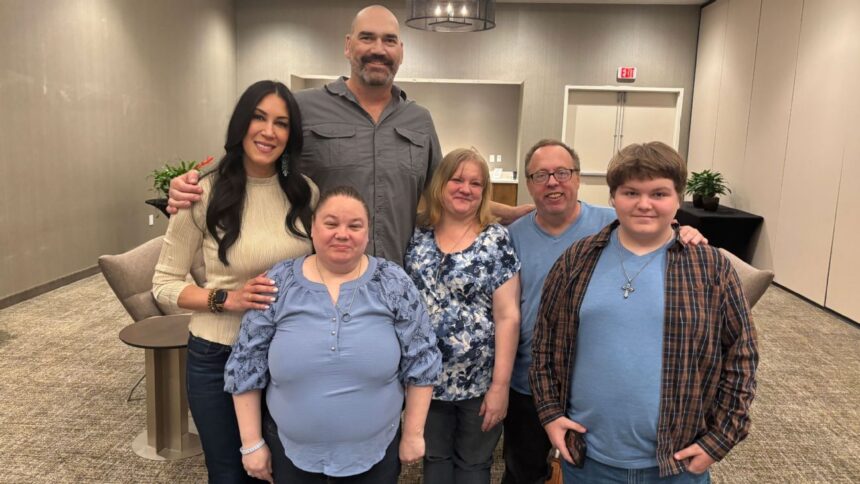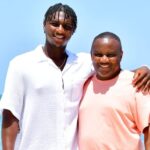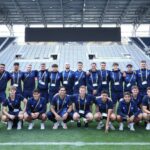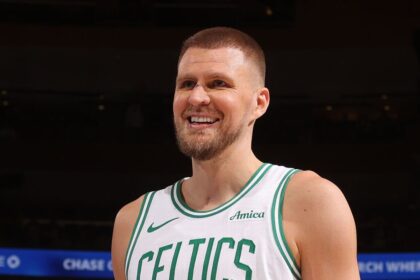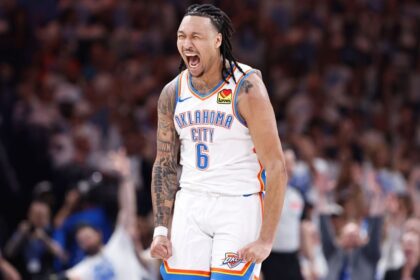Scot Pollard’s Second Chance: A New Heart, A New Life
Last October, seven months after a heart transplant saved his life, NBA veteran Scot Pollard was back in the hospital. However, this time, the visit wasn’t for him. Ozzy Pollard, the third of his four children, injured his anterior cruciate ligament and meniscus during an American football game. He needed surgery to repair both injuries. The Pollards were familiar with the stress of surgery, as Scot had battled for three years against a genetic heart disease. During his time at the University of Kansas and in the NBA, Scot became an icon for many fans. He was known for his unique personality, his extravagant hairstyles, and his fierce competitiveness. However, after more than a decade of retirement, Scot’s spirit began to decline. Medical visits, examinations, and questions became his daily routine. At 48 years old, a man who had been a symbol of physical strength was suffering from active heart failure.Scot received a new heart on February 16, 2024. Organ donation is governed by strict anonymity. Neither the donor’s family nor the recipient receives details about the other, unless the transplant patient decides to initiate contact. After reflecting for five months on his experience, Scot decided to send a letter to the anonymous family of his donor. In it, he called him a hero. «My name is Scot, I live in Indiana and I am writing this letter to express my and my family’s gratitude for the gift of life from your loved one. My wife, myself, our four children, our extended family and friends, we are eternally grateful!». He continued: «We would love to have the opportunity to meet you at some point if you agree with that idea. We want you to know that your loved one’s heart will be loved and cared for, and that it will return love. We have already begun to raise awareness about donation in our community and are expanding nationally. I have already connected with multiple donor networks in various communities to help them promote donation. Your loved one is our hero and will live forever through me and our efforts to get more people to be selfless heroes like him. If you are not comfortable responding, I completely understand. I just wanted you to know my lifelong gratitude for him. He really is my hero». Scot delivered the letter to his hospital, which in turn sent it to the donor’s hospital, where it was delivered to the donor’s family. They would have the final say on how to respond, or whether they would.“I remember feeling, ‘If this is all, I’ll be okay. But if not, I have a lot to do’”.
Scot Pollard
Days passed, then weeks. His hopes of receiving news from the family that saved him diminished. Three months after sending the letter, while his family was in the hospital with Ozzy, Scot checked his email. They had responded.“I can understand very well how many people would say, ‘I don’t want to meet the person who received a kidney, lungs, or eyes. It’s too much,'” Scot said. “And transplant programs prepare you for that, so that most people don’t respond.”
Scot Pollard
A Race Against Time
On February 6, 2024, Scot Pollard was dying. The day before, he and his wife, Dawn, arrived at Vanderbilt University Medical Center in Nashville, Tennessee, for a three-day heart transplant evaluation. Scot was already registered on transplant lists in Indianapolis and Chicago. His goal was to get on the Nashville list, 300 miles south of his home in Carmel, Indiana, in the hope that another transplant region would mean a greater chance of finding a match. Dr. Jonathan Menachem, cardiologist at the hospital, placed his hands on Scot’s wrist.“Your pulse is slow,” he said. “Is it always quite slow?”
Dr. Jonathan Menachem
Scot lay down on a bed, where Menachem placed his stethoscope on Scot’s chest. “Are you short of breath just lying like this?” he asked him. Scot closed his eyes and nodded.
“Seeing someone lying like that and running out of breath so quickly is worrying,” said Menachem.
Dr. Jonathan Menachem

Scot’s heart was failing. He had been suffering from cardiomyopathy, a disease that makes it difficult for the heart muscle to pump. With more strain on the muscle and more blood required for his large body, he was weakening day by day.“He was full of fluid and didn’t have enough blood flow throughout his body,” Menachem said. “They thought they were going home to Indiana. We looked at each other,” Menachem said, referring to himself and his colleague as they reviewed Scot’s prognosis. “We said, ‘This guy can’t go home.’”
Dr. Jonathan Menachem
While preparing for further tests, several nodes were attached to his chest and fingers, and the constant beeping of the cardiac monitor served as a constant reminder of what was to come.“I am very attached to this heart,” he said in the hospital. “I feel it’s the best. It’s the one I was born with. And the biggest fear is that the next one won’t be good enough.”
Scot Pollard
“I’m really not afraid of anything,” Scot said. “Now, when you’re sitting here, waiting for a new heart, the unknown can be scary.”
Scot Pollard
A Family Legacy
Scot inherited his height from his father, Pearl, who was 6 feet 8 inches tall. When he was diagnosed with cardiomyopathy, he realized he had inherited it too. In 1952, Pearl’s father moved the family from Montana to Utah in the hope of turning his son into a boxer. But, as Scot tells it, the basketball coach got to Pearl first. Pearl played as a pivot for Jordan High School, south of Salt Lake City, and was quickly christened “Poison” Pollard for his lethal hook shot. He won consecutive state high school championships with the Beetdiggers, setting the state tournament scoring record in 1955. Earlier that year, he appeared alongside Wilt Chamberlain in a Life magazine publication featuring the tallest high school basketball players in the country. Pearl played at the University of Utah from 1956 to 1959 and was the team’s top scorer in the 1958-59 season. “He was a giant in every possible way,” said Scot. When Scot was 12 years old, the family moved from Utah to San Diego, where he first noticed his father’s health beginning to decline. Three years later, at 53 years old, Pearl was diagnosed with cardiomyopathy. He was placed on the heart transplant list, but needed an organ donor of similar size. Given its imposing height, finding one would be almost impossible.One morning in October 1991, Scot was coming up from the beach after surfing in gym class. Pearl passed by in her white city-issued truck and stopped to chat briefly with her son. A few hours later, Scot received a phone call from a friend. He told him that Pearl’s van had crashed into the parking lot of a country club and that paramedics were on the scene. Pearl had suffered a heart attack while driving. She died on the transplant list. Scot was 16 years old. He was the last of his family to see his father alive.“We knew it was a death sentence,” said Scot, who was the youngest of six children. “I was just thinking, ‘God, I’m going to grow up without a father.’”
Scot Pollard

The Road to Hope
Scot never forgot his father’s fate. After a career as a healthy player, he continued to check his heart regularly. In January 2021, he visited the doctor for an annual physical exam. This appointment, like all previous ones, went without worry. However, a month later, Scot received a flu shot, and doctors believe it released a “genetic anomaly” that triggered his heart failure.“A couple of days later, I got the flu,” Scot said, “and it attacked my heart. I couldn’t cross the room.”
Scot Pollard
What came next was a progressively more terrifying three-year period of appointments, treatments, and hospital visits, culminating in the realization that he would need a heart transplant to survive. The doubt that he would find one and the guilt that he deserved it overwhelmed him. Someone would have to die to give me life. Scot had experienced and lived more than most, he thought: a significant college basketball career that had taken him to an admirable NBA career, which had helped him build his beloved family and pursue his dreams. Surely there were stronger candidates for this life-saving surgery opportunity. Dawn was also skeptical. But she needed to convince her husband of the fallacy of this last thing, reminding him of his responsibilities as a husband and father, of how much they still had to live. He listened, and finally agreed.“We will never know for sure what happened,” said Menachem, “but he was clearly predisposed to having a heart that wouldn’t function well throughout his life.”
Dr. Jonathan Menachem
“How do I even dare to think about doing to my children what my father unintentionally did to me?”, Scot thought.
Scot Pollard
The next step was to find a heart strong enough to support his body. “You can’t put a Ford Festiva engine in an F-150 and think it’s going to work,” said Menachem. While Pearl died waiting for a donor of the same size, Scot had hope. Medical technology had advanced to allow for greater variation in size.“I didn’t want him to grow up without a father who was there and taught him,” Ozzy said. “And I love him for that.”
Ozzy Pollard
On Scot’s 49th birthday, his sixth day in Vanderbilt’s Intensive Care Unit, he received news of a possible donor. He called his family members to the hospital. He shaved his head and beard in preparation for the surgery. But the doctors determined that the proposed heart would not be viable. Another option arose shortly after. It was also rejected.

A Gift of Life
Pamela Angell and Megan Tyra were sitting in a hospital in East Texas when they were told they had 14 days to make the most devastating decision of their lives. Casey, Pamela’s husband, had been intubated; he could no longer breathe on his own. Casey and Pamela had met in 2009 while working at Walmart. He was someone who could “talk to a stranger until they were tired of it,” she says, and often did. When Pamela was pregnant with her son, William, Casey found a new position as a forklift operator. But exposure to the elements at work, in addition to a history of smoking, had taken its toll. In February 2024, a bout of pneumonia had sent him to the hospital, where he was in and out of consciousness. Days passed. Then a week. Then more. Angell had not shown any sign of improvement, nor of life. On the 11th, Pamela and Megan, Casey’s sister, made the decision to let him go. Shortly thereafter, the hospital’s organ donation link approached them.“He said, ‘Look, guys, Casey had a really big heart,’” said Megan.
Megan Tyra
“Yes, we know,” replied Megan’s husband, Clint.
Clint
Angell was 5 feet 11 inches. In 1991, that wouldn’t have been big enough to save Pearl Pollard. But in 2024, it would be big enough to save Scot.“He said: ‘No, man, you don’t understand. Physically he had a big heart,’” Megan said. “And I said: ‘Is that important?’ He said: ‘Oh yes, that’s important’”.
Megan Tyra
Pamela and Megan agreed to the anonymous organ donation process and watched Angell’s heart leave the hospital. “You’re losing your best friend,” Pamela said, “but someone else is gaining your best friend, in a way.”
On the morning of February 16, when Angell’s heart was traveling from Texas to Tennessee, Vanderbilt staff began preparing Scot for the transplant surgery. The doctors gathered the endless tubes and wires that tethered him to his hospital room and rearranged them for the short trip to the operating room.
Amidst the constant beeping of the cardiac monitor, Scot began his farewells.“Who is my fourth favorite son?”, said Scot, hugging his youngest son, Icean.
Scot Pollard
“Me?”, said Icean.
Icean
Then, Dawn took her husband’s head in her hands and leaned over the bed to give him a kiss. “I love you,” she said, smiling through her tears.Scot leaned in. “That’s right,” he said, putting their foreheads together. “You.”
Scot Pollard
“I love you forever,” said Scot, running his fingers through his long, dark hair. “I love you forever,” she told him.
Dawn

Shortly after 11 a.m., Scot was taken to surgery. At 1:08 p.m., a black van entered the Adult Emergency Entrance of the hospital. In the trunk, the doctors took out a white cooler and ran inside. Inside a smaller plastic container was Angell’s heart. At 1:16, the doctors removed Scot’s heart from his body.“I was thinking, ‘Okay, what if he doesn’t wake up?’” she said later. “That’s when it finally hit me. I was thinking about what life would be like… without him.”
Dawn
Thirteen minutes later, his new heart was sewn and his blood was restored. At 5 p.m., the procedure was complete.“Now, there’s no heart there,” said Dr. Ashish Shah, one of the cardiac surgeons who performed the operation. “There’s a giant, enormous, unhappy hole, and when that old heart came out, you see a huge, unhappy organ.”
Dr. Ashish Shah
“In some ways,” Shah said, “it was the right heart for him.”
Dr. Ashish Shah
An Unexpected Encounter
One afternoon in mid-October of last year, Scot and Dawn were standing on the sidelines of the Carmel High School football field. It was senior night. As the sun set behind the bleachers, they waited to hear Ozzy’s name. Only two weeks after his knee surgery, so he couldn’t play, Ozzy walked onto the field in celebration, with his father by his side. “It’s like I have my dad back from when he was younger,” Ozzy said. However, the Pollards are very aware that their relief, their joy, had come at a huge cost. On the day of Ozzy’s surgery, inside the hospital room, Scot checked his email. And there it was, the answer he had been waiting so long to receive. As soon as Pamela received Scot’s letter, she called Megan and they decided to respond, interested in learning more about the man who held Casey’s heart, and sharing more about the man he came from. Scot read the letter aloud.Dear Scot: Thank you so much for reaching out to us. Scot, you touched our hearts with your kind words about your donor, who was loved beyond measure. February 16, 2024 was an incredibly difficult day for those of us who loved your donor, Casey. When we knew we were going to have to let him go, and we were approached about organ donation, there was never a pause or a doubt that Casey would have wanted to help. So the answer was simple, and it was a yes.
Scot’s voice began to break. He continued reading. Casey was a husband, father, uncle, and the best little brother anyone could ask for. Although he was the baby, he surpassed us all. Thank you for taking care of that big heart of his. And we are grateful to know that he is loved and that he will continue to give love. It means the world to us. He has inspired people in his own family to donate and be a hero like him. And we, as his family, though small, would love to meet you when you are ready to do so. Megan wrote that Angell was a “gentle giant” who was always happy to help those in need. “We are blessed to know that even in our greatest tragedy we remained true to what he was,” she wrote, “and we are so happy that, thanks to our hero, you can continue to be a blessing to your family and to others.” The families spoke for the first time by phone on November 9, on what would have been Angell’s 46th birthday. After exchanging text messages, they decided to meet in person. On March 17, 2025, Scot and Dawn were in Lindale, Texas, a small town about 90 miles east of Dallas. When the couple left their hotel room, Dawn took her husband’s hand.Holding hands, they walked down the hall towards the room where Angell’s family awaited them. Rounding the final corner, they saw the family through an open doorway, breaking into nervous laughter before exchanging hugs with Pamela, William, Megan, and Clint. “Hello, gang,” said Scot, before he and Dawn extended their arms. Scot learned that William was 12 years old when his father died, and that he was “the love of [his father’s] life.” “We are grateful that Scot is here, with Casey’s heart,” Pamela said. “And William has another person to look up to, like a father figure.” William told stories of their afternoons together fishing or watching horror movies, describing his father as gentle and also a giant. Casey and Scot had tattoos of dragons, William’s Japanese zodiac sign.“Ready?”, she asked softly, smiling at him. “Ready”, he replied.
Dawn
“There was a connection there that I felt,” Scot said. “I know how that feels as a child, to lose your father.”
Scot Pollard
Pamela showed Dawn and Scot Casey’s wedding ring, which she wears on a chain around her neck, and shared the story of how they met. Megan explained that although she and Casey had other siblings, the two were the closest. “He was my bubba,” she said.“You look like your father,” Dawn said to William. “Copied and pasted, that’s how we say it,” Megan replied.
Megan
Before going out to lunch together, Pamela took out a stethoscope she had brought. Scot stood up and unbuttoned his shirt while Pamela placed it right on his chest. As she listened to the heart beating inside him, her eyes filled with tears.
Megan was next. “My turn,” she said. She gently placed the stethoscope just to the right of a long, vertical scar, a lasting reminder of what was given and what was lost. With Scot watching her, she tilted her head and listened. “Hey, Bubba,” she said, crying.
A Future of Hope
On Memorial Day weekend, under sunny skies, the Pollards, Angells, and Tyras cruised the streets of downtown Indianapolis, waving to an enthusiastic crowd. A year after Scot’s transplant, he was named grand

